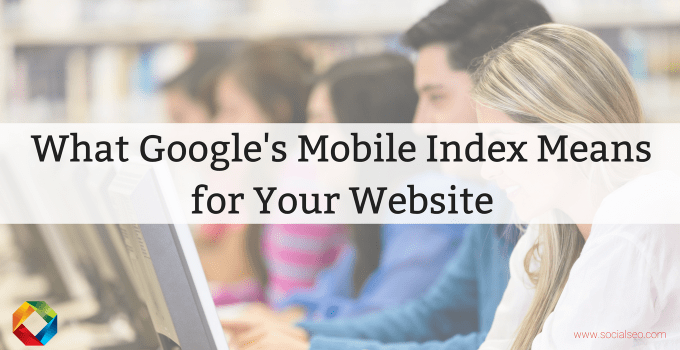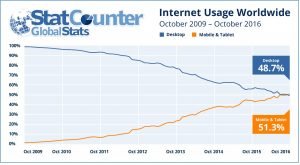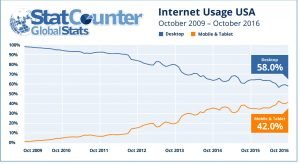If you have a website, whether it’s for informing potential clients and consumers about your…

Google Announces Mobile Index To Become Primary Index — What this Means for Your Website
Google Announces Mobile Index To Become Primary Index — What this Means for Your Website
If you have a website, you need to educate yourself on one of the largest changes from Google this year. On Oct 13, 2016 at Pubcon, Gary Illyes from Google, announced they are switching to a mobile first index. This is one of the largest shakeups this year and has very big consequences for website and SEO performance.
Why Mobile First Index is A Game Changer
Google has always used the desktop version of your website as a primary index. In layman’s terms, this means your website version that customers see on their desktop computers is the information Google uses to crawl through to store information about your website and uses that information to rank your keywords and your website in their search results. This announcement means that very soon, Google will begin indexing the mobile version of your site, instead of the desktop version, to rank your keywords and in their search results. Google’s goal is to make this complete transition “within months”.
Why Index Mobile Sites First?
Google is focused on a mobile first mindset. According to an independent web analytics company StatCounter, mobile and tablet internet usage (51.3%) exceeded desktop usage (48.7) for the first time worldwide this past October. Back in May, 2015 Google found from their internal data that “more Google searches take place on mobile devices than on computers in 10 countries including the US and Japan.”


How Will This Impact My Website?
If you have a adaptive or responsive mobile site, chances are your website will show the same content across mobile and desktop devices so there should be minimal impact to you. However, if your mobile website is built on a different platform than your desktop site, you could potentially have two different versions of your website with varying information. In other words, if your site ranks well in desktop search results, you may not necessarily rank well in mobile search results if each platform has different content.
Is Your Business Mobile Ready?
Per the US Census Bureau, about half of small businesses do not have a website, and of those that do, 23% are not mobile friendly. Google has a quick guide on getting started with mobile friendly sites:
https://developers.google.com/webmasters/mobile-sites/
A Quick Guide to Mobile First Index
Mobile will soon be the primary index and desktop will be a secondary and separate index.
What does this mean?
- Mobile and desktop users will get different and varying search engine results, which means varying positions for keywords between your mobile site and desktop site.
- Mobile users will get the most up to date content of your site instantly, desktop users will experience a time delay
What Does this Mean to SEO and Website Owners?
- Your site can potentially lose traffic and rankings if it’s not mobile friendly
- Having a mobile standalone site may not be enough as there may be fluctuations in search engine results and ranking for keywords & you may need to re-evaluate your website to become an adaptive or responsive site rather than using two separate platforms
What Should I Do?
- If your site is not mobile friendly, you may start losing rankings or visibility in the search engine results. Updating your site to be fully responsive or adaptive will help.
- Evaluate your mobile site content: is it a good representation of your business or the most current version of how you want to portray yourself online?
For professional mobile site assistance, give the wonderful team at SocialSEO a call today!



